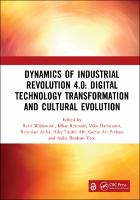Dynamics of Industrial Revolution 4.0: Digital Technology Transformation and Cultural Evolution
Proposal review
Proceedings of the 7th Bandung Creative Movement International Conference on Creative Industries (7th BCM 2020), Bandung, Indonesia, 12th November 2020
| dc.contributor.editor | Wulandari, Ratri | |
| dc.contributor.editor | Resmadi, Idhar | |
| dc.contributor.editor | Haristianti, Vika | |
| dc.contributor.editor | Aulia, Rahmiati | |
| dc.contributor.editor | Afif, Riky Taufik | |
| dc.contributor.editor | Prahara, Gema Ari | |
| dc.contributor.editor | Yeru, Aulia Ibrahim | |
| dc.date.accessioned | 2021-08-04T07:52:19Z | |
| dc.date.available | 2021-08-04T07:52:19Z | |
| dc.date.issued | 2021 | |
| dc.identifier | OCN: 1267989751 | |
| dc.identifier.uri | https://library.oapen.org/handle/20.500.12657/50303 | |
| dc.description.abstract | The 7th Bandung Creative Movement conference presented the theme "Dynamics of Industrial Revolution 4.0" which discussed how the digital world and connectivity changed human culture in various aspects of life, and transformed in accordance to human needs and social culture. Digital technology has transformed society to serve people from manufacturing needs to smart cities, from network connectivity to people connectivity. The application of information technology has helped in improving live quality and environmental sustainability. Digital transformation is revolutionizing how businesses and workers interconnect to be more productive and efficient. The result is improved collaboration, faster processes and time-to-market, lower costs and better products. Devices are getting smarter, meaning they are able to perform more and more tasks without human intervention; moreover, these devices generate data that provide insights to further improve processes and gain greater efficiencies. Moreover, with the Internet of Things (IoT), all these smart devices are interconnected in ways that not only help make them even smarter, but also enhances the intelligence of the overall system. Digital technology is a formidable driver for the transformation of a highly carbon-dependent world into one that is more ecologically ‘smart.’ We are entering a new era of environmental innovation that is driving better alignment between technology and environmental goals. Since its first announcement in 2011, industrial revolution 4.0 has dynamically changed and transformed to adjust itself to the human needs and to serve more efficiency and effectiveness of everyday life as well as environmental enhancement. The 7th Bandung Creative Movement has brought forward discussions on dynamic changes, ups and downs, innovations, relations of industrial revolution of the internet of thing, data, automation, to human physical world, new art and aesthetic, business, product innovation, built environment, and education. | en_US |
| dc.language | English | en_US |
| dc.subject.classification | thema EDItEUR::U Computing and Information Technology::UT Computer networking and communications | en_US |
| dc.subject.classification | thema EDItEUR::U Computing and Information Technology::UB Information technology: general topics::UBW Internet: general works | en_US |
| dc.subject.classification | thema EDItEUR::J Society and Social Sciences::JB Society and culture: general | en_US |
| dc.subject.classification | thema EDItEUR::T Technology, Engineering, Agriculture, Industrial processes::TN Civil engineering, surveying and building | en_US |
| dc.subject.classification | thema EDItEUR::T Technology, Engineering, Agriculture, Industrial processes::TG Mechanical engineering and materials::TGP Production and industrial engineering | en_US |
| dc.subject.other | Aesthetic evolution;creative sector;environmental transformation | en_US |
| dc.title | Dynamics of Industrial Revolution 4.0: Digital Technology Transformation and Cultural Evolution | en_US |
| dc.title.alternative | Proceedings of the 7th Bandung Creative Movement International Conference on Creative Industries (7th BCM 2020), Bandung, Indonesia, 12th November 2020 | en_US |
| dc.type | book | |
| oapen.identifier.doi | 10.1201/9781003193241 | en_US |
| oapen.relation.isPublishedBy | 7b3c7b10-5b1e-40b3-860e-c6dd5197f0bb | en_US |
| oapen.relation.isbn | 9781032044521 | en_US |
| oapen.relation.isbn | 9781003193241 | en_US |
| oapen.relation.isbn | 9781032044514 | en_US |
| oapen.imprint | Routledge | en_US |
| oapen.pages | 382 | en_US |
| peerreview.anonymity | Single-anonymised | |
| peerreview.id | bc80075c-96cc-4740-a9f3-a234bc2598f1 | |
| peerreview.open.review | No | |
| peerreview.publish.responsibility | Publisher | |
| peerreview.review.stage | Pre-publication | |
| peerreview.review.type | Proposal | |
| peerreview.reviewer.type | Internal editor | |
| peerreview.reviewer.type | External peer reviewer | |
| peerreview.title | Proposal review | |
| oapen.review.comments | Taylor & Francis open access titles are reviewed as a minimum at proposal stage by at least two external peer reviewers and an internal editor (additional reviews may be sought and additional content reviewed as required). |

